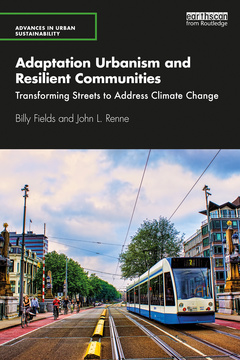Adaptation Urbanism and Resilient Communities Transforming Streets to Address Climate Change Advances in Urban Sustainability Series
Auteurs : Fields Billy, Renne John L.

Adaptation Urbanism and Resilient Communities outlines and explains adaptation urbanism as a theoretical framework for understanding and evaluating resilience projects in cities and relates it to pressing contemporary policy issues related to urban climate change mitigation and adaptation.
Through a series of detailed case studies, this book uncovers the promise and tensions of a new wave of resilient communities in Europe (Copenhagen, Rotterdam, and London), and the United States (New Orleans and South Florida). In addition, best practice projects in Amsterdam, Barcelona, Delft, Utrecht, and Vancouver are examined. The authors highlight how these communities are reinventing the role of streets and connecting public spaces in adapting to and mitigating climate change through green/blue infrastructure planning, maintaining and enhancing sustainable transportation options, and struggling to ensure equitable development for all residents. The case studies demonstrate that while there are some more universal aspects to encouraging adaptation urbanism, there are also important local characteristics that need to be both acknowledged and celebrated to help local communities thrive in the era of climate change. The book also provides key policy lessons and a roadmap for future research in adaptation urbanism.
Advancing resilience policy discourse through multidisciplinary framework this work will be of great interest to students of urban planning, geography, transportation, landscape architecture, and environmental studies, as well as resilience practitioners around the world.
1. Introduction 2. Urban Resilience 3. From Urban Resilience to Street Resilience: Rethinking the Role of Streets in the Climate-Adapted City 4. Adaptation Urbanism: An Urban Resilience Policy Framework 5. Rotterdam: The Resilient Delta City 6. Building on the Base: Copenhagen Climate Innovation 7. London: From Regional Resilience to Healthy Streets 8. New Orleans: When Bouncing Back is Not Enough 9. South Florida and Miami: Rising Seas and a Fragmented Response 10. Adaptation Urbanism: European and North American Examples 11. Adaptation Urbanism: Policy Implications 12. Conclusion: The Emerging Era of Resilient Streets
Billy Fields is an Associate Professor of Political Science at Texas State University. His research focuses on understanding the key elements of resilient communities. He is the co-editor of Transport Beyond Oil (2013) and leads the International Sustainable Transportation Engagement Program, an annual study abroad program in the Netherlands exploring best practices in active transportation.
John L. Renne is Professor and Director of the Center for Urban and Environmental Solutions (CUES) in the Department of Urban and Regional Planning at Florida Atlantic University.
Date de parution : 05-2021
15.6x23.4 cm
Date de parution : 05-2021
15.6x23.4 cm
Thèmes d’Adaptation Urbanism and Resilient Communities :
Mots-clés :
Green Infrastructure; Adaptation Urbanism; sustainable cities; Climate Adaptation; urban sustainability; Resilience Planning; climate change; Climate Mitigation; infrastructure planning; Blue Infrastructure; Decrease GHG Emission; Urban Resilience; sustainable transport; Vulnerable Road Users; equitable development; Water Squares; blue health design; Cycle Tracks; blue urbanism; Bicycle Infrastructure; UN; Climate change issues; Urban climate change mitigation; GHG Emission; Transportation planning; Spatial Efficiency; Coastal communities; De Pijp; Resilience Projects; Traffic Calming; Active Transport; Electric Vehicles; Autonomous Vehicles; Resilience Policy; GI Planning; Green Streets



